Heart disease remains the #1 cause of death globally, affecting millions each year. While genetics and lifestyle play a role, your daily diet is one of the most powerful tools to protect your heart. In fact, what you eat can either support or sabotage your cardiovascular health. Choosing the right foods isn’t just about feeling full—it’s about fueling your body with the nutrients it needs to keep your heart beating strong.
That’s where heart healthy foods come in.
These are not just trendy dietary choices; they’re scientifically proven to reduce cholesterol, lower blood pressure, improve circulation, and reduce inflammation—key factors in preventing heart disease. Whether you’re trying to prevent issues before they start or manage an existing condition, including the right food for the heart in your daily routine can make a significant difference.
Think of it this way: every bite you take is either a food good for heart health—or a missed opportunity to support it. When you consistently choose food for heart strength and function, you’re investing in your long-term well-being. The goal is to fill your plate with food of heart—nutrient-rich options that work with your body, not against it.
This guide will walk you through the most effective heart healthy foods, what types of ingredients to avoid, and practical, science-backed strategies to incorporate these choices into your lifestyle. From powerful fruits and vegetables to lean proteins and healthy fats, you’ll discover how to build a diet full of food for strong heart performance.
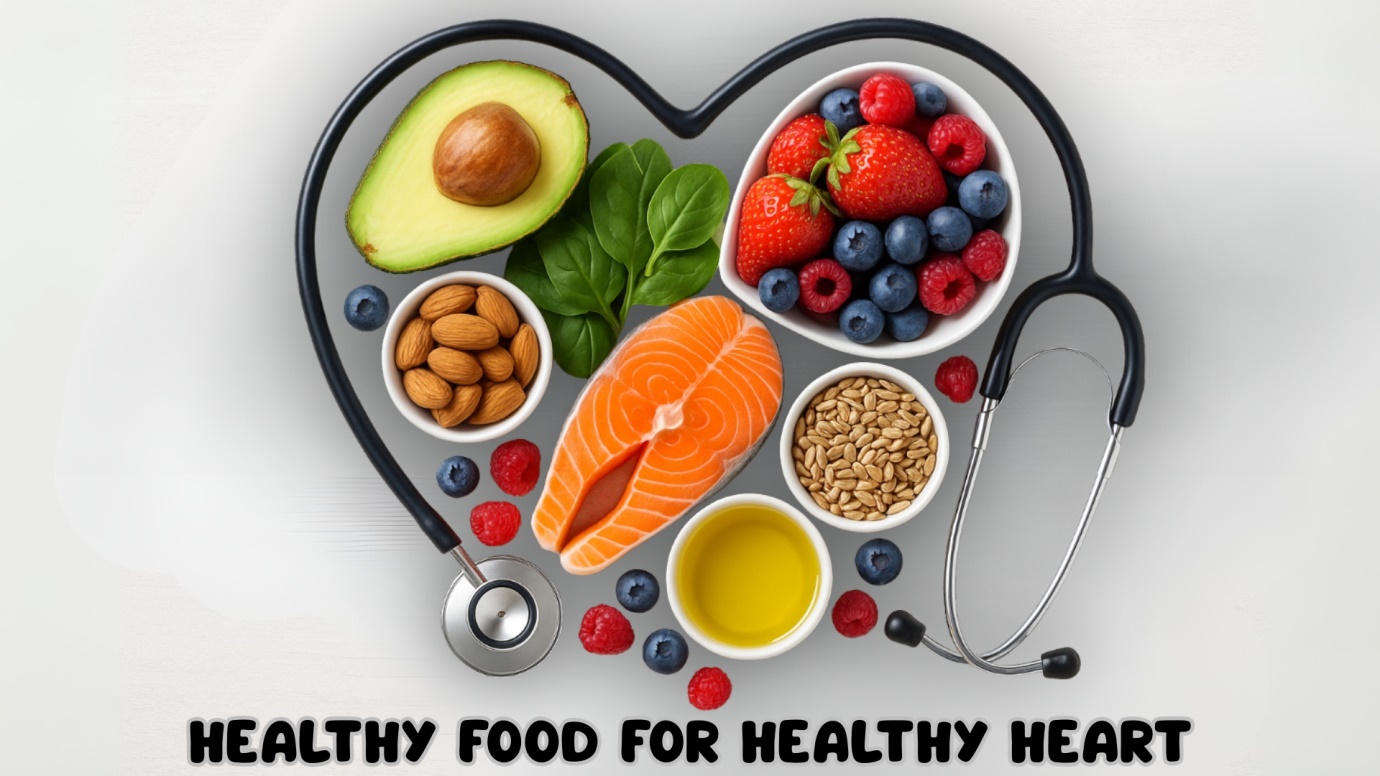
What Are Heart-Healthy Foods?
When we talk about heart healthy foods, we refer to ingredients and meals that actively support the well-being of your heart and blood vessels. These foods aren’t just beneficial—they’re essential to maintaining healthy blood pressure, balanced cholesterol levels, and smooth arterial function.
In simple terms, cardiac healthy foods are natural, nutrient-rich choices that protect your cardiovascular system from long-term damage. They help reduce the risk of heart attacks, strokes, and chronic heart diseases. Choosing the right cardiovascular food is one of the most effective ways to improve your health naturally—without medication.
What Makes a Food “Heart-Healthy”?
To be classified as food for cardiovascular health, it must contain one or more of the following nutrients that directly benefit the heart:
Fiber (especially soluble fiber):
Helps lower LDL (bad) cholesterol and supports blood sugar regulation. Found in oats, beans, lentils, and whole grains.Omega-3 Fatty Acids:
Reduce inflammation and prevent arterial plaque. Common in fatty fish like salmon, flaxseeds, and walnuts.Antioxidants:
Help prevent oxidative stress and cell damage. Found in berries, dark chocolate, green tea, and leafy greens.Potassium & Magnesium:
Aid in blood pressure regulation and muscle function. Present in bananas, avocados, and sweet potatoes.Phytonutrients:
Plant-based compounds that reduce inflammation and improve circulation—abundant in colorful fruits and vegetables.
These nutrients work in synergy, turning ordinary meals into cardiac friendly foods that keep your arteries clean and your heartbeat steady.
Why Are They Important?
Incorporating more foods that strengthen the heart isn’t just about preventing disease—it’s about enhancing your everyday quality of life. A diet rich in food that keeps heart healthy can:
- Reduce the risk of hypertension
- Lower cholesterol levels
- Improve blood vessel flexibility
- Decrease inflammation throughout the body
- Enhance energy levels and mental clarity
Choosing heart healthy foods is not a restrictive diet—it’s a nourishing, empowering way to care for your body from the inside out. These foods are the cornerstone of a longer, stronger, and more vibrant life.
Top Heart-Healthy Foods to Include in Your Diet
Creating a daily diet full of good heart healthy foods isn’t just about making healthy choices—it’s about making smart, strategic choices that protect and improve cardiovascular function. The following are some of the most heart healthy foods, broken into categories so you can easily build a balanced, heart-friendly plate every day.
These selections are rich in essential nutrients, antioxidants, healthy fats, and fiber—making them the best foods for heart health and overall wellness.
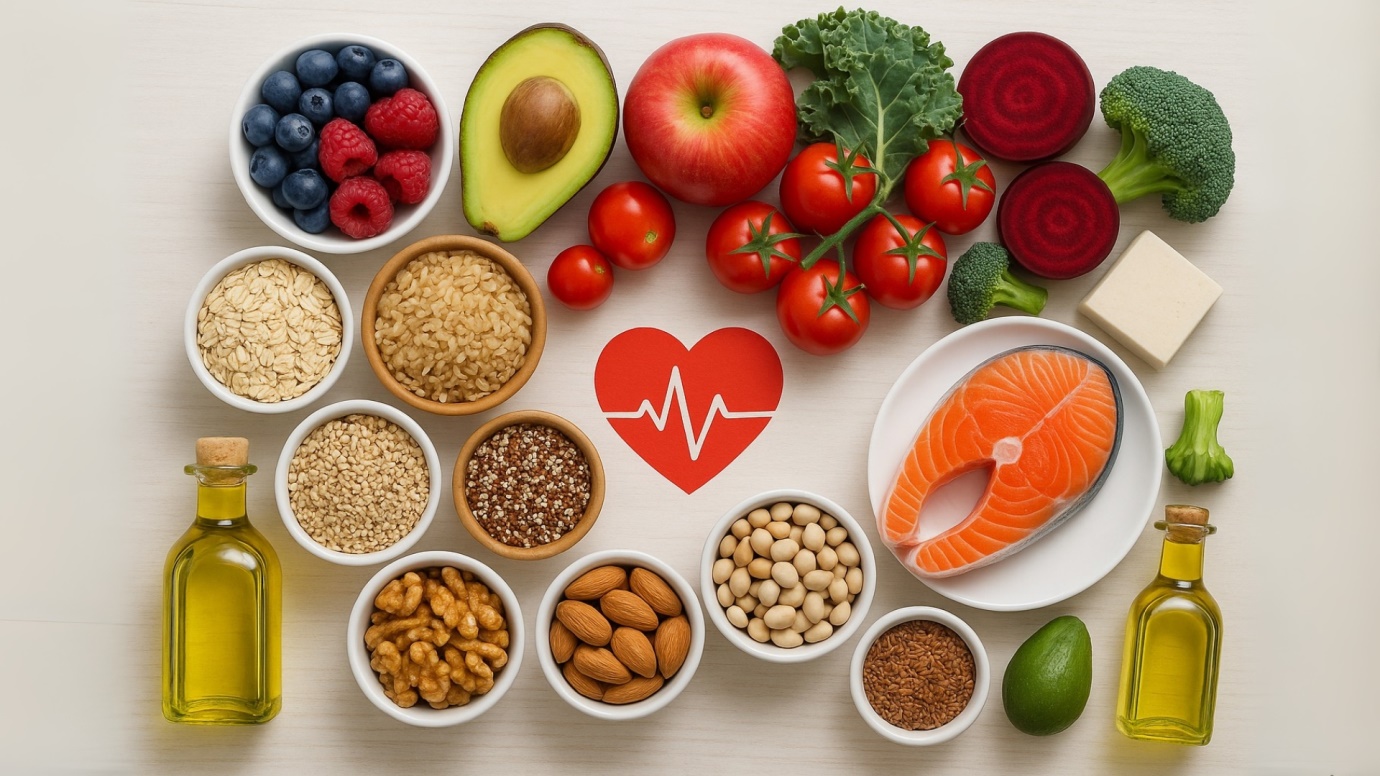
A. Fruits & Vegetables
Fruits and vegetables are widely recognized as the top foods for heart health due to their high levels of vitamins, minerals, antioxidants, and anti-inflammatory compounds.
Fruits for Heart Health
- Berries like blueberries and strawberries are among the best fruits for the heart thanks to their rich antioxidant content, which helps lower blood pressure and reduce artery stiffness.
- Avocados are loaded with healthy fats and potassium—both essential for maintaining a strong heartbeat and optimal blood pressure.
- Citrus fruits, apples, and pomegranates are powerful fruits for heart health that support cholesterol control and vascular health.
These are not just fruits good for heart function; they are also deeply nourishing and versatile for snacks, smoothies, and salads.
Vegetables That Are Good for the Heart
- Leafy greens like spinach, kale, and Swiss chard are nutrient-dense heart healthy vegetables packed with nitrates, which help improve arterial flexibility.
- Tomatoes, beets, and sweet potatoes are rich in potassium, lycopene, and fiber—making them the best vegetables for heart
- Cruciferous vegetables like broccoli and Brussels sprouts are also among the fruits and vegetables good for the heart due to their anti-inflammatory properties.
B. Whole Grains
Whole grains are high in soluble fiber, which helps reduce LDL (bad) cholesterol—making them critical foods to improve heart health.
Include in your meals:
- Oats (especially for breakfast foods that lower triglycerides)
- Brown rice
- Quinoa
- Barley
These options also aid in blood sugar balance and are essential foods that reduce heart disease risks.
C. Healthy Proteins
Not all proteins are equal. Some are the best food for heart health, while others can increase cardiovascular risk.
Best options include:
- Fatty fish like salmon, sardines, and trout—rich in omega-3 fatty acids, they are the best foods for heart health and circulation.
- Legumes like beans, chickpeas, and lentils—excellent plant-based proteins and high in fiber.
- Tofu and edamame are great meat alternatives and part of a heart healthy foods list for vegetarians.
These proteins are all foods that prevent heart problems and should be eaten at least a few times a week.
D. Nuts & Seeds
Nuts and seeds are nutrient powerhouses. They contain heart-boosting healthy fats, fiber, magnesium, and antioxidants—making them key foods that strengthen the heart.
Recommended options:
- Walnuts, almonds, chia seeds, and flaxseeds
- Best dry fruits for heart: Dates, figs, and raisins (in moderation)
These are foods that cleanse arteries and are also foods that clean your arteries naturally over time.
E. Heart-Healthy Fats & Oils
Not all fats are bad. In fact, unsaturated fats from natural sources are vital foods for better heart health.
Choose:
- Olive oil and avocado oil – rich in monounsaturated fats that reduce inflammation and promote clear arteries
- Replace butter and ghee with these oils to build a heart healthy foods list for cooking and dressings
Avoid trans fats entirely and limit saturated fats—these are not foods to prevent cardiovascular disease, but contributors to it.
Bonus: Other Foods That Help
Foods that lower heart rate fast:
Green leafy vegetables, garlic, and omega-3-rich fishFoods that clean arteries:
Berries, leafy greens, nuts, and fatty fishFoods that reduce cardiovascular disease:
A combination of whole grains, fruits, vegetables, and healthy fats
Filling your daily meals with these best foods for heart health is one of the most powerful, preventative steps you can take. Whether you’re eating to protect your heart, recover from a condition, or simply live a longer and more vibrant life—these foods are your natural allies.
Foods to Avoid for a Healthy Heart
While adding heart-healthy foods to your diet is crucial, equally important is knowing what to eliminate. Certain items may seem harmless on the surface, but they can silently damage your arteries, raise your cholesterol, spike your blood pressure, and increase inflammation in the body. These are the foods bad for the heart, and avoiding them is essential for long-term cardiovascular health.
For anyone looking to protect their heart, recover from a diagnosis, or maintain heart function after a procedure like a stent, here are the foods to avoid for cardiovascular disease prevention.
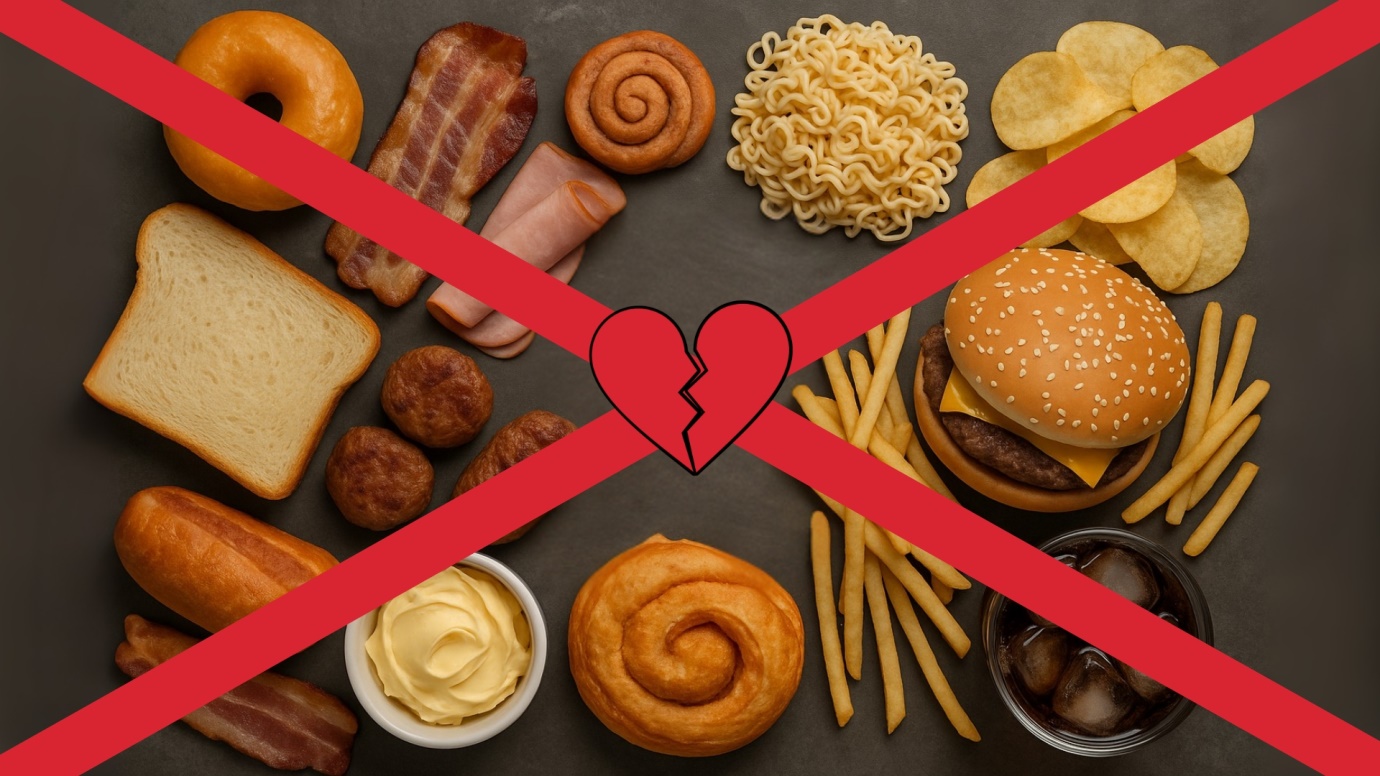
Processed and Red Meats
These include sausages, bacon, ham, hot dogs, and deli meats. They are high in saturated fats, sodium, and preservatives—all of which increase the risk of clogged arteries and heart disease.
- These are among the most common unhealthy foods for heart
- They are especially foods to avoid with heart problems such as high cholesterol or hypertension.
- Red meats, when eaten frequently, become cardiovascular disease foods to avoid for anyone with a family history of heart issues.
Refined Carbs and Sugars
White bread, sugary breakfast cereals, pastries, and desserts made with white flour cause blood sugar spikes and contribute to insulin resistance.
- Considered a leading food not good for heart due to their inflammatory effect.
- Regular consumption is linked to obesity and type 2 diabetes, which worsen heart health.
- For people recovering from a heart condition, these are dangerous heart disease food to avoid.
High-Sodium Packaged and Processed Foods
Canned soups, ready-to-eat meals, instant noodles, chips, and processed sauces often contain excessive salt, which raises blood pressure dramatically.
- A silent contributor to heart strain and a major bad food for heart failure
- These are key foods to avoid for cardiovascular disease risk reduction.
- People with high blood pressure or a heart stent must be especially cautious—these are definite heart stent foods to avoid.
Trans Fats and Hydrogenated Oils
Found in many baked snacks, margarine, and fast foods, trans fats raise LDL (“bad”) cholesterol and lower HDL (“good”) cholesterol.
- Categorized among the most harmful cardiovascular disease foods to avoid.
- Promote arterial plaque buildup and inflammation—core contributors to heart attacks.
- Whether you’re aiming to improve health or avoid complications, these are clear foods to avoid cardiovascular disease.
Sugar-Sweetened Beverages
Sodas, sweetened juices, energy drinks, and even some flavored waters are loaded with added sugars that can increase fat buildup around the heart and liver.
- These drinks qualify as unhealthy foods for heart because they offer no nutrients and high calories.
- Strongly recommended as foods to avoid with heart problems, especially for diabetic patients or those with high triglycerides.
These are not just poor food choices—they are literal foods bad for the heart and should be limited or eliminated, especially if you have or are at risk for heart conditions.
By cutting down on these unhealthy foods for heart function, you create space in your diet for nourishing, healing alternatives. Prevention starts in the kitchen—and what you don’t eat matters just as much as what you do.
How to Build a Heart-Healthy Meal Plan
Creating a balanced, nourishing meal plan doesn’t have to be complicated—especially when your goal is simply to incorporate more heart healthy foods into your daily routine. Whether you’re cooking at home or planning your grocery list, it helps to have a clear idea of how to structure your meals using a variety of food good for heart wellness.
A well-thought-out plan can make it easier to follow through with healthy choices and gradually replace less nutritious habits. The idea isn’t to follow a strict diet, but to include more food for the heart in a way that’s enjoyable, flexible, and sustainable.
Note: This information is provided for general guidance only. Always consult a healthcare professional for personalized nutrition advice.
Key Principles of a Heart-Healthy Meal Plan
- Focus on whole, minimally processed foods
- Incorporate color and variety with fruits and vegetables
- Prioritize lean proteins and healthy fats
- Choose fiber-rich grains and legumes
- Limit sodium, added sugars, and saturated fats
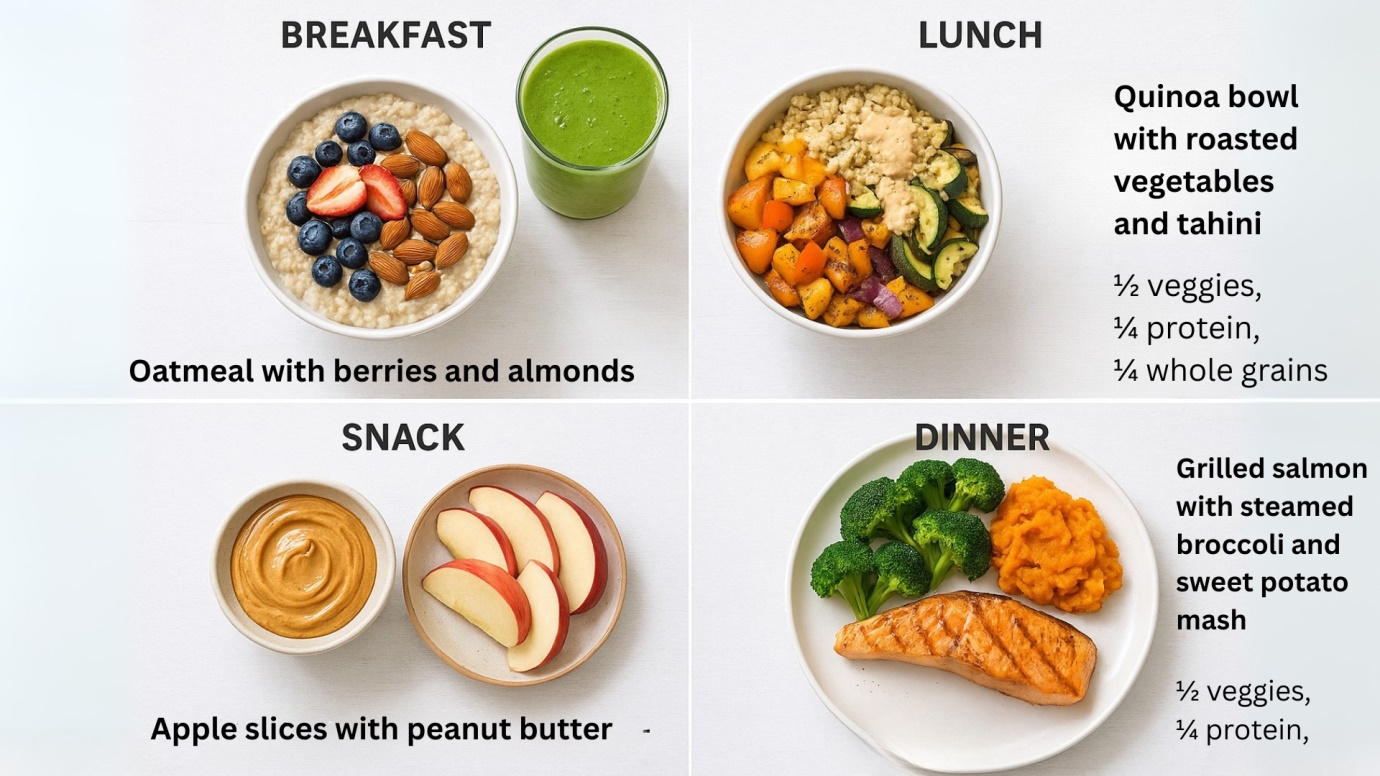
Example Daily Meal Structure
Here’s a sample layout to inspire your own heart healthy food ideas throughout the day:
Breakfast
- Oatmeal with chia seeds, berries, and a few almonds
- Green smoothie with spinach, banana, flaxseeds, and almond milk
- Whole grain toast with avocado spread
These are excellent examples of heart healthy food recipes that are both simple and satisfying.
Lunch
- Grilled tofu or chickpea salad with leafy greens, olive oil, and lemon
- Quinoa bowl with roasted vegetables, a drizzle of tahini, and a sprinkle of seeds
- Lentil soup with whole grain crackers
Snack
- A handful of walnuts or pistachios
- Sliced apples with peanut butter
- Greek yogurt with ground flaxseed and fruit
Dinner
- Baked salmon with steamed broccoli and sweet potato mash
- Stir-fried vegetables with tofu and brown rice
- Whole wheat pasta with sautéed spinach, garlic, and cherry tomatoes
These options showcase healthy food for healthy heart living without sacrificing flavor or satisfaction.
Portion Size Matters
In addition to food choices, portion control plays an important role in heart health:
- Fill ½ of your plate with food for healthy heart like vegetables and fruits
- Allocate ¼ of your plate to lean proteins (beans, fish, tofu)
- Use the remaining ¼ for whole grains like oats, quinoa, or brown rice
- Stick to thumb-sized servings of oils and fats for balance
Eating in moderation helps manage weight, blood pressure, and cholesterol—factors closely linked to heart function.
Smart and Practical Swaps
Making small changes can lead to big improvements over time. Here are some simple, everyday swaps to turn ordinary meals into heart healthy foods:
- Butter → Olive oil
- White rice → Quinoa or brown rice
- Fried snacks → Baked or roasted veggies
- Sugary cereal → Steel-cut oats with fruit
- Creamy dressings → Olive oil + lemon or vinegar
These alternatives are affordable, accessible, and perfect additions to your growing list of heart healthy food recipes at home.
Expert Tips to Stay Consistent with Heart-Healthy Eating
Building a routine around healthy foods for heart health is one thing—sticking to it consistently is another. It’s easy to start strong, but long-term success requires planning, awareness, and flexibility. With a few smart strategies, you can make eating food for heart health an enjoyable part of your everyday life.
This section shares expert-backed, practical tips to help you stay on track, even on busy days or while dining out. And as always, remember: this guide is for informational purposes only. Please consult a doctor or dietitian for medical advice tailored to your needs.
Meal Prep for the Win
Planning ahead can save you time and ensure your meals support your heart goals. It also reduces last-minute unhealthy choices, especially when you’re hungry and tired.
Simple meal prep ideas using cardiac healthy foods:
- Cook a big batch of dal with turmeric, spinach, and lentils—portion it for lunch throughout the week
- Prepare quinoa or millet in advance as a base for nourishing bowls
- Pre-chop veggies for salads or stir-fries to make it easier to reach for food for heart meals
- Soak oats overnight with chia seeds, almonds, and berries for a ready-to-go breakfast
These habits make it easier to consistently include the best food for heart in your day-to-day diet.
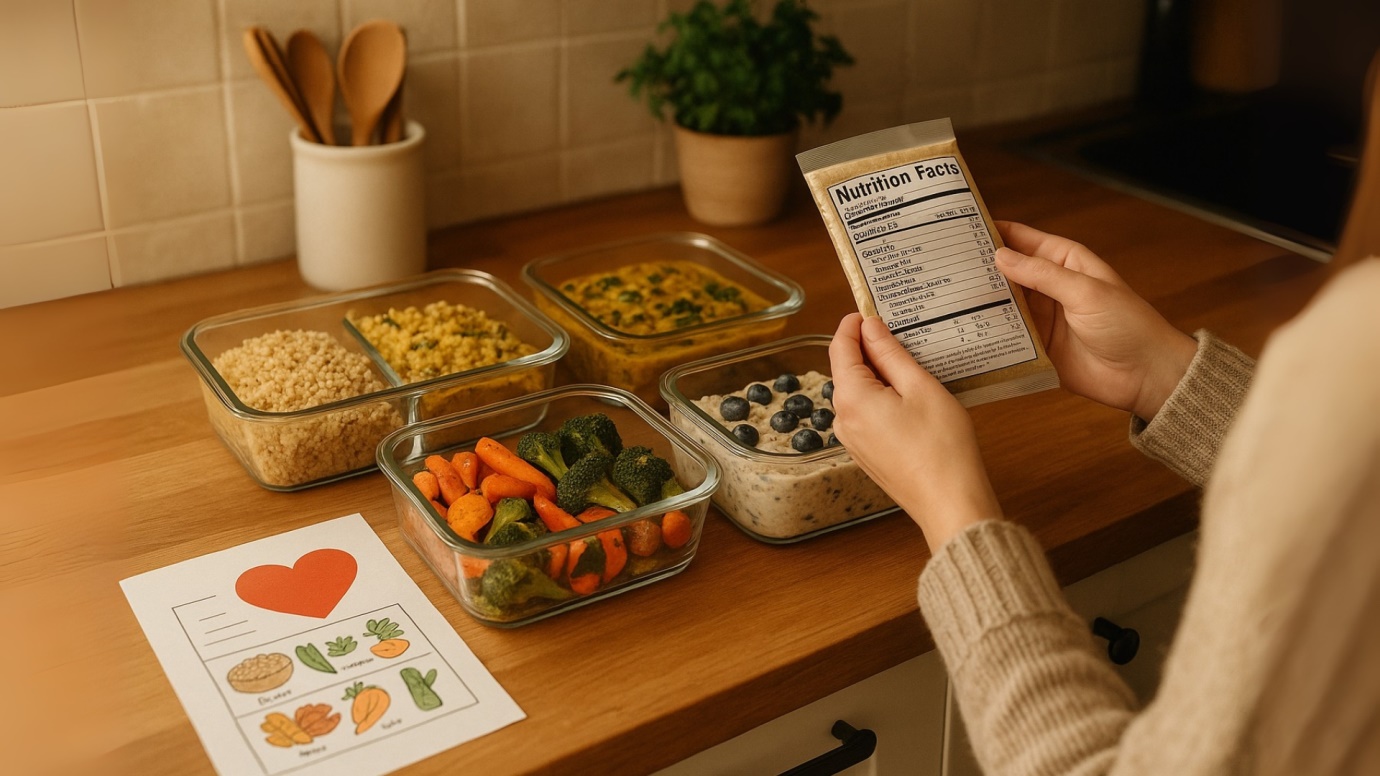
Read Food Labels Like a Pro
Understanding labels helps you make smarter choices, especially when buying packaged or processed items.
Here’s what to look out for when choosing heart disease foods to eat and foods to avoid:
- Sodium: Aim for less than 140mg per serving
- Saturated fat: Keep it below 5% of your daily value per item
- Trans fat: Should always be 0g
- Added sugars: Watch for hidden names like corn syrup, dextrose, or maltose
Being label-savvy helps you consistently choose foods to eat to avoid heart disease and limit hidden risks.
Dining Out Smartly
Eating out doesn’t have to mean sacrificing your health. With a few thoughtful decisions, you can still enjoy restaurant meals while sticking to your heart goals.
Tips for eating food to eat for heart problems when dining out:
- Ask for grilled instead of fried
- Choose whole grains like brown rice or millet if available
- Request less salt or added sugar in your dish
- Opt for tomato-based sauces over cream-based ones
- Replace naan or refined bread with whole-wheat or millet roti
These simple swaps ensure you’re still opting for healthy foods for heart health, even outside your home.
Incorporate Traditional Indian Foods
Indian cuisine is rich in ingredients that can easily be adapted for heart wellness. By making smart tweaks, you can create comforting and familiar meals using cardiac healthy foods.
Examples of Indian food for heart problem prevention and care:
- Idli made with oats or ragi instead of white rice
- Millet roti instead of refined flour chapati
- Dal with turmeric and leafy greens for anti-inflammatory benefits
- Buttermilk with roasted cumin for digestion and heart support
- Homemade khichdi with moong dal and veggies—light and nourishing
These aren’t just tasty—they’re also some of the foods to eat to avoid heart disease while keeping cultural roots intact.
Consistency doesn’t mean perfection—it means staying mindful of your choices. Whether it’s a home-cooked meal, a restaurant order, or a traditional family recipe, there’s always a way to infuse it with food for heart support. With a bit of planning and awareness, your everyday meals can include the best food for heart, naturally and deliciously.
FAQs
Q1. What are the most effective heart healthy foods I can include in my daily diet?
- The most effective heart healthy foods include leafy greens, berries, fatty fish, whole grains like oats and quinoa, legumes, and healthy fats such as olive oil and avocado. These foods are rich in nutrients that support overall cardiovascular health.
Q2. Why is it important to eat food for the heart regularly?
- Eating food for the heart ensures your body receives essential nutrients like fiber, omega-3s, and antioxidants. These help regulate blood pressure, reduce cholesterol, and protect your arteries from damage.
Q3. Can traditional Indian foods be considered food good for heart health?
- Yes, dishes like dal with vegetables, millet roti, and oats-based idlis are excellent examples of food good for heart support. With minor tweaks, many traditional Indian meals can be made heart-friendly.
Q4. What should I avoid eating for better heart health?
- To protect your heart, avoid foods bad for the heart such as processed meats, fried foods, sugary drinks, high-sodium snacks, and items with trans fats. These can increase inflammation and plaque buildup in arteries.
Q5. Are there specific foods to eat to avoid heart disease?
- Yes, foods to eat to avoid heart disease include fatty fish, flaxseeds, legumes, berries, and leafy greens. These help manage cholesterol and reduce arterial inflammation.
Q6. What are the best heart healthy food ideas for breakfast?
- Great heart healthy food ideas for breakfast include overnight oats with chia seeds, fruit smoothies with spinach, or whole grain toast topped with avocado and flaxseeds.
Q7. Can you list a few cardiac healthy foods for vegetarians?
- Yes! Some excellent cardiac healthy foods for vegetarians include lentils, tofu, spinach, broccoli, almonds, chia seeds, and whole grains like barley or brown rice.
Q8. What is a good food to eat for heart problems in Indian cuisine?
- A great food to eat for heart problems in Indian cuisine includes moong dal khichdi, lightly sautéed greens, millet roti, and turmeric-spiced vegetables. These options are gentle and heart-friendly.
Q9. Are fruit juices considered healthy foods for heart health?
- Whole fruits are better. While fruit juices can offer some nutrients, they often lack fiber and contain added sugars. For true healthy foods for heart health, eat whole fruits like berries, apples, and citrus.
Q10. What’s the best food for heart to eat post-workout?
- After a workout, opt for food for heart recovery like grilled fish with quinoa, a smoothie with berries and flaxseeds, or a bowl of lentil soup with brown rice to restore nutrients and reduce inflammation.
When it comes to protecting your most vital organ, what you eat truly matters. Throughout this guide, we’ve explored how choosing the right heart healthy foods can make a powerful difference—not just in managing risk factors, but in actively supporting a longer, more vibrant life.
Whether you’re just beginning your journey or already conscious of your choices, embracing more food for the heart can be a life-enhancing commitment. From colorful fruits and leafy greens to whole grains, nuts, and healthy fats, every meal is an opportunity to include food good for heart function and vitality.
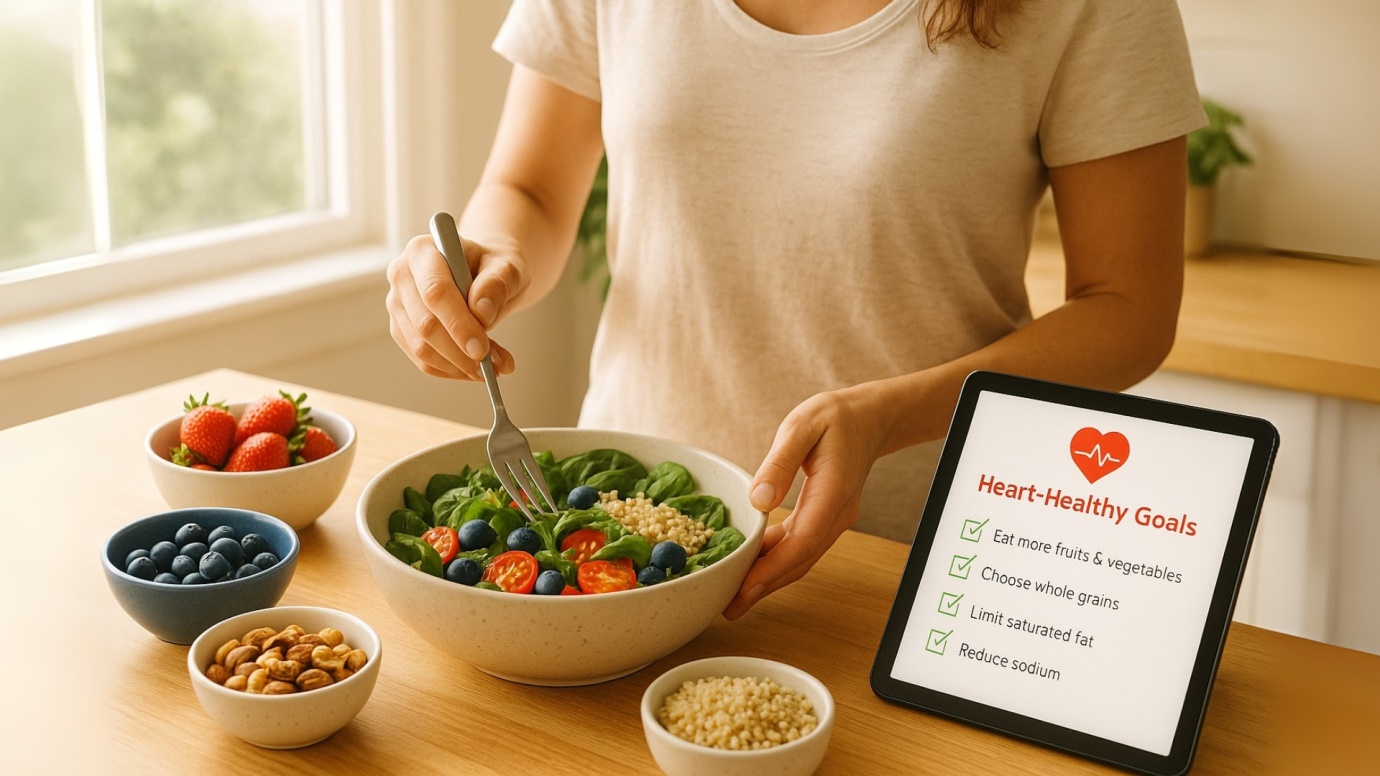
And remember—this doesn’t require dramatic overhauls. The path to a food for strong heart lifestyle is paved with small, sustainable changes:
- Swapping white rice with quinoa or millet
- Choosing olive oil instead of butter
- Adding a handful of nuts or seeds to your salad
- Drinking more water and less sugary beverages
These choices, repeated daily, add up to powerful improvements. And while there’s no “magic meal” or one-size-fits-all diet, consistently leaning toward food for heart wellness creates a solid foundation for long-term health.
At its core, a heart-healthy lifestyle is simply about enjoying more of the food of heart—nourishing, whole ingredients that support you from the inside out.
Ready to Take the Next Step?
If you’re looking to build a personalized approach with guidance, you can explore diet plans, custom nutrition guides, or expert consultations on Moto nutrition. Whether your goal is prevention, recovery, or simply eating smarter, our team is here to help you eat well—and live well.
For more information on our personalized diet plans and nutritional support, visit our Homepage.
Disclaimer:
This blog is intended for informational purposes only and should not be taken as medical advice or a substitute for professional consultation. While adopting a diet rich in heart healthy foods can support overall wellness and complement medical treatment, diet alone does not replace medication. It may help enhance the effectiveness of prescribed therapies and reduce dependency over time.
If you are dealing with a heart condition or any other critical health issue, we strongly recommend consulting a qualified healthcare professional or certified nutritionist before trying any remedies, supplements, or medications discussed or implied in this content.
Always prioritize professional guidance for your individual health needs.